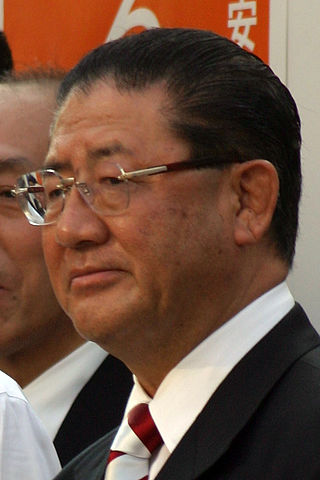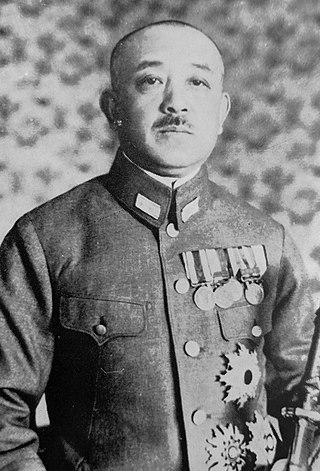Knock Yokoyama | |
|---|---|
| 横山 ノック | |
| Governor of Osaka Prefecture | |
| In office 23 April 1995 –22 December 1999 |
| International | |
|---|---|
| National | |
| Academics | |
Knock Yokoyama | |
|---|---|
| 横山 ノック | |
| Governor of Osaka Prefecture | |
| In office 23 April 1995 –22 December 1999 |
| International | |
|---|---|
| National | |
| Academics | |

The Japanese political process has two types of elections.

Taku Yamasaki is a Japanese politician who served in the House of Representatives from 1972 to 2003 and from 2005 to 2009. He directed the Director General of the Japan Defense Agency for two months in 1989, and served as Minister of Construction from 1991 to 1992. He was a prominent faction leader in the Liberal Democratic Party (LDP) during the late 1990s and early 2000s, and served as its Secretary-General and Vice President under Prime Minister Jun'ichirō Koizumi.

General elections were held in Japan on 11 September 2005 for all 480 seats of the House of Representatives, the lower house of the Diet. Prime Minister Junichiro Koizumi called the election almost two years before the end of the term taken from the previous elections in 2003, after bills to privatize Japan Post were voted down in the upper house, despite strong opposition from within his own Liberal Democratic Party (LDP).
Events in the year 2004 in Japan.
Events in the year 1992 in Japan. It corresponds to Heisei 4 (平成4年) in the Japanese calendar.
Isamu is a masculine Japanese given name.

Yukio Aoshima was a Japanese politician who served as Governor of Tokyo from 1995 to 1999. He is also well known as a TV actor, novelist, film director, screenwriter and songwriter.

Yaichi Tanigawa is a Japanese politician who served in the House of Representatives between 2003 and 2024. He served as a member of the Liberal Democratic Party until 2024.

General elections were held in Japan on 16 December 2012. Voters gave the Liberal Democratic Party a landslide victory, ejecting the Democratic Party from power after three years. It was the fourth worst defeat suffered by a ruling party in Japanese history.
Events in the year 2010 in Japan.
The 17th unified local elections in Japan took place in April 2011. In the first phase on April 10, 2011, 12 governors, 41 prefectural assemblies as well as five mayors and 15 assemblies in cities designated by government ordinance were elected. In the second phase on April 24, 2011, mayors and assemblies in hundreds of cities, "special wards" of Tokyo, towns, and villages were up for election. Additionally, a by-election for the National Diet was held in Aichi on April 24.
Events in the year 2012 in Japan.
Events in the year 1995 in Japan. It corresponds to Heisei 7 (平成7年) in the Japanese calendar.

Isamu Yokoyama was a general in the Imperial Japanese Army, commanding Japanese ground forces in China during the Second Sino-Japanese War and Pacific War. In 1948, he was sentenced to death by a military commission for Yokohama War Crimes Trials due to his direct command responsibility for vivisection and other human medical experiments performed at the Kyushu Imperial University on downed Allied airmen.

The Party for Japanese Kokoro, officially the Party to Cherish the Heart of Japan, was a Japanese political party. It was formed as the Party for Future Generations on 1 August 2014 by a group of Diet members led by Shintarō Ishihara. The party adopted its final name in December 2015, and ended up dissolving in November 2018.

General elections were held in Japan on 22 October 2017. Voting took place in all Representatives constituencies of Japan – 289 single-member districts and eleven proportional blocks – in order to appoint all 465 members of the House of Representatives, the lower house of the then 707-member bicameral National Diet of Japan. Incumbent Prime Minister Shinzō Abe's governing coalition of the Liberal Democratic Party (LDP) and the Komeito party retained their seats in signs of what was perceived as weak opposition. Abe won his fourth term in office and held on to the two-thirds supermajority in order to implement policies on revising the war-renouncing Article 9 of the Japanese Constitution.
The first stage of the 18th unified local elections in Japan took place on April 12, 2015. The Liberal Democratic Party under leadership of Shinzo Abe was the overall victor, winning many races including all ten gubernatorial races and 1,153 of the 2,284 assembly seats at stake. Further elections for municipal mayors and assemblies took place on April 26.
The Japan Innovation Party is a conservative and centre-right to right-wing populist political party in Japan. Formed as Initiatives from Osaka in October 2015 from a split in the old Japan Innovation Party, the party became the third-biggest opposition party in the National Diet following the 2016 House of Councillors election.

General elections were held in Japan on 31 October 2021, as required by the constitution. Voting took place in all constituencies in order to elect members to the House of Representatives, the lower house of the National Diet. As the constitution requires the cabinet to resign in the first Diet session after a general election, the elections will also lead to a new election for Prime Minister in the Diet, and the appointment of a new cabinet, although ministers may be re-appointed. The election was the first general election of the Reiwa era.

The 2023 Osaka mayoral election was held on 9 April 2023 as part of the 20th unified local elections to elect the next mayor of Osaka. Incumbent mayor Ichiro Matsui decided not to seek a second term as mayor of Osaka, opting to retire from politics at the end of his term. The election resulted in a landslide victory for Hideyuki Yokoyama, the candidate from the Osaka Restoration Association, who secured 64% of the vote. Taeko Kitano, who was supported by the Liberal Democratic Party and Komeito received 26% of the vote.